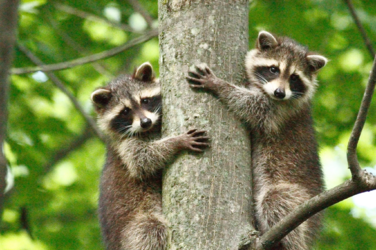Raccoons are rapidly spreading in Tokyo, stymying local officials

Tokyo has found itself o-fur-run with invasive, North American raccoons and local officials have found efforts to curtail their growing numbers to be largely ineffective.
Thousands of the omnivorous critters were brought to Japan from Canada and the U.S. after a 1970s anime called Rascal the Raccoon popularized the idea of caring for raccoons as pets. At the peak of Japan’s raccoon craze, up to 1,500 raccoons were being brought into the country.
Japan eventually banned raccoon imports, but the damage was done.
Just as the protagonist of Rascal the Raccoon learns, these wild animals are not meant to be pets and are better off in nature. Many of Japan’s raccoon owners came to the same conclusion and let their four-legged friends free. Some raccoons took the decision into their own tiny hands and escaped. Without any natural predators, these furry interlopers have spread across the country, leaving a path of destruction in their wake.
Tokyo specifically has seen a fivefold increase in the number of raccoons caught each year in the past decade. In 2012, officials trapped 259 raccoons. By 2022, that number had jumped to 1,282.
And this only captures a small portion of Tokyo’s raccoon problem; a municipal official told the Mainichi Shimbun that only a fraction of raccoons are successfully caught because they’re so adept at breaking out of cages.
“Our traps are sometimes broken as raccoons are also desperate to live,” the official said. “Only a fraction is actually caught, so we are unable to grasp their overall range.”
Raccoons are a stubborn issue for Japan’s farmers, in particular. They’ve been blamed for millions of dollars worth of damage to crops over the years.
In 2022, raccoon-related damage cost the national agriculture industry about 450 million yen, or C$4 million, according to the Mainichi Shimbun.
In 2006, 16 Japanese prefectures reported raccoons had eaten a combined 164 million yen (C$1.4 million) in crops, and the critters seemed to particularly enjoy grapes, corn and melons, the Japan Times reported.
Apart from crop damage, raccoons have also been blamed for attacking Japanese residents.
In 2011, the city of Amagasaki was terrorized by aggressive raccoons. Seven attacks were reported within a month, all occurring in a 1.5-kilometre radius involving people walking their dogs.
At the time, Japanese wildlife experts theorized that the local raccoons may have been threatened by dogs in the area and developed a hostility for man’s best friend. The city believed that the aggressive raccoons were all part of one family, based on witness accounts.
Today, in some parts of western Tokyo, officials have been setting up traps and urging residents to call in raccoon reports if they are spotted entering homes or damaging crops.
Despite all these measures, the battle against raccoons may end up being futile. Raccoons are highly adaptive to human environments and are rapid breeders. Places like Germany have also been overrun by raccoons, causing environmental damage. Despite exterminating about tens of thousands of raccoons a year, Germany’s raccoon problem persists.
As many Canadians living in urban centres can attest, a raccoon can become a neighbour for life.

